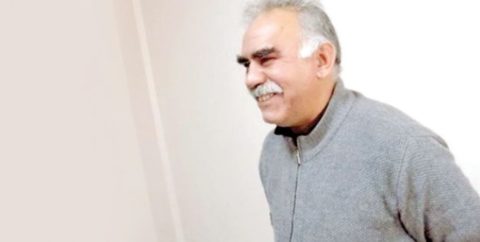By Arian Mufid:
15th February marked the 21st anniversary of the leader of the PKK, Abdullah Ocalan’s imprisonment. Abdullah Ocalan was kidnapped by the Kenyan state who were paid and motivated by a joint operation involving several state intelligence services such as MIT, CIA and Mossad. Abdullah Ocalan is nicknamed ‘APO’ (meaning uncle in Kurdish), coined by his followers as a term of endearment for their leader. Born 4th July 1949 in Urfa to a religious family, according to his brother, Serok Apo always stood out amongst his siblings for his unique personality and different ideas. From his studies at his local mosque he was introduced to the writings of the Islamic philosophy Said Nauracy whose works he was thoroughly impressed by.
On moving to Ankara, aged 11, the religious influence on his life disappeared. He completed his primary and secondary school in Ankara. In 1966, he finished his degree in sociology and continued on to study Law during the 1970s at Ankara University. In 1972, Apo entered the College of Political and Economic Science where he was influenced by Marxist Leninist ideas which he utilised as an ideology to counteract the policies of the racist Turkish state. In 1972, due to his political affiliation with the Turkish left wing, Apo was sentenced to seven months in jail.
In the 1970s, during a family visit, his father warned and advised Apo to abstain from involvement and advocation of Leftist politics since the Turkish state apparatus is ruthless in surpressing these political ideas and beliefs. On his second visit home with Jamel Bayek, his father warned him again to never use the words Kurd and Kurdistan, in fear of what severe punishment his son would face at the hands of the Turkish state. On one occasion he told his son that being an advocate of the Leftist movement is less risky than being affiliated with Kurdish political aspirations as the punishment for the latter is far worse. From that moment on, Ocalan realised how unjustly criminalised the Kurdish identity is in Turkey. He told his dad, “To be a Kurd is hard, but to escape from it is unethical. I am your son and don’t want to accept that ”. Ocalan also told Jamil Bayek ‘My father understands that to be a Kurd in Turkey is more dangerous than to be left wing or communist’.
In 1978, having been long affiliated with Turkish Marxist groups, Ocalan formally founded his own organisation by the name of ‘Kurdistan Workers Party’, commonly referred to as the ‘PKK’. The first PKK conference inside North Kurdistan took place with 23 members present. The party held its second conference in 1982 in Lebanon. During that conference, the PKK decided to send an organised group back to the North of Kurdistan to fight Turkish military junta. From all walks of life, people joined the ranks of the PKK where they were trained and sent back to the north of Kurdistan to fight. In 1984 PKK Lieutenant Saeed Korkomaz formed the Kurdistan Liberation Army. In March 1986 Korkomaz was killed after waging the fight against the Turkish army all over the North of Kurdistan. Following the kidnapping of Ocalan, the PKK held an informal seventh conference and since its creation over 40 years ago, the group has announced a bilateral ceasefire up to eleven times.
As a result of Turkey’s war on Kurds more than 25,000 followers of the PKK have been killed and assassinated all over Kurdistan, even beyond the borders of Turkey. The Turkish army is responsible for destroying more than 20,000 villages in Northern Kurdistan. Furthermore, almost twenty thousand Turkish soldiers have been killed in this war. The PKK’s current leaders include Cemil Bayik and Murat Karayilan.
Having also 20,000 lives in the Kurdish-Turkish conflict, the Turkish state should realise that their military pressure will not aid in solving the Kurdish issue both within and beyond Turkish borders. Today the PKK is stronger than ever before, with around 20,000 military personal and a 100 million dollar budget. The PKK has defied the borders that divide Kurds, having established branches all over Kurdistan, and also collaborates with PJAK working in East Kurdistan and the PYD working in West Kurdistan.
.jpg)



